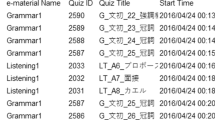Abstract
This study examined the interaction effects of three pacing procedures and perception of locus of control on student final examination performance in a PSI course. College students identified by the Rotter Internal-External Locus of Control Scale as expecting external reinforcement performed better under the reward and control conditions, and those identified as expecting internal reinforcement did better under the penalty condition. Student anxiety was postulated as having been a factor affecting performance.
Similar content being viewed by others
Reference Note
Henneberry, J. K, Locusof control and experience as related to the prediction of academic performance and the use of course contingencies in a Personalized System of Instruction. Unpublished manuscript, Le Moyne College (Syracuse, New York), 1975.
References
Allen, G. J., Giat, L., & Cherney, R. J. Locus of control, test anxiety, and student performance in a personalized instruction course.Journal of Educational Psychology, 1974, 66, 968–973.
Alpert, R., & Haber, R. N. Anxiety in academic achievement situations.Journal of Abnormal and Social Psychology, 1960, 61, 207–215.
Austin, S. N., & Gilbert, K. E. Student performance in a Keller Plan course in introductory electricity and magnetism.American Journal of Physics, 1973, 41, 12–18.
Bostow, D. E., & O’Connor, R. J. A comparison of two college classroom testing procedures: Required remediation versus no remediation.Journal of Applied Behavioral Analysis, 1973, 6, 599–607.
Calhoun, J. F. The combination of elements in the Personalized System of Instruction.Teaching of Psychology, 1976, 3, 73–76.
Cheney, C. D., & Powers, R. B. A programmed approach to teaching in the social sciences.Improving College and University Teaching, 1971, 19, 164–166.
Cronbach, L. J., & Snow, R. E.Aptitudes and instructional methods. New York: Irvington, 1977.
Fernald, P. S., Chiseri, M. J., Lawson, D. W., Scroggs, G. F., & Riddell, J. C. Systematic manipulation of student pacing, the perfection requirement, and contact with a teaching assistant in an introductory psychology course.Teaching of Psychology, 1975, 2, 147–151.
Keller, F. S., “Goodbye teacher. . .”Journal of Applied Behavioral Analysis, 1968, 1, 79–89.
Keller, F. S. Ten years of personalized instruction.Teaching of Psychology, 1974,1, 4–9.
Keller, J. M., Goldman, J. A., & Sutterer, J. R. Locus of control in relation to academic attitudes and performance in a Personalized System of Instruction course.Journal of Educational Psychology, 1978, 70, 414–421.
Kleinbaum, D. G., & Kupper, L. L.Applied regression analysis and other multivariable methods. North Scituate, Mass.: Duxbury, 1978.
Kulik, J. A., Jaksa, P., & Kulik, C. C. Research on component features of Keller’s Personalized System of Instruction.Journal of Personalized Instruction, 1978, 3, 2–14.
Kulik, J. A., Kulik, C. C., & Cohen, P. A. A meta-analysis of outcome studies of Keller’s Personalized Systems of Instruction.American Psychologist, 1979, 34, 307–318.
Kulik, J. A., Kulik, C. C., & Hertzler, E. C. Modular college teaching with and without required remediation.Journal of Personalized Instruction, 1977, 2, 70–75.
Lefcourt, H. M.Locus of control: Current trends in theory and research. Hillsdale, N.J.: Erlbaum, 1976.
Lloyd, K. E. Contingency management in university courses.Educational Technology, 1971, 11(4), 18–23.
Malott, R. W., & Svinicki, J. G. Contingency management in an introductory psychology course for one thousand students.Psychological Record, 1969,19, 545–556.
Miller, L. K., Weaver, F. H., & Semb, G. A procedure for maintaining student progress in a personalized university course.Journal of Applied Behavior Analysis, 1974,7, 87–91.
Powers, R. B., Edwards, K. A., & Hoehle, W. F. Bonus points in a self-paced course facilitates exam-taking.The Psychological Record, 1973,23, 533–538.
Prociuk, T. J., & Breen, L. J. Locus of control, study habits and attitudes, and college academic performance.The Journal of Psychology, 1974,88, 91–95.
Ramanaiah, N. V., Ribich, F. D., & Schmeck, R. R. Internal external control of reinforcement as a determinant of study habits and academic attitudes.Journal of Research in Personality, 1975, 9, 375–384.
Reiser, R. A., & Sullivan, H. J. Effects of self-pacing and instructor-pacing in a PSI course.The Journal of Educational Research, 1977, 71, 8–12.
Rotter, J. B. Generalized expectancies for internal versus external control of reinforcement.Psychological Monographs, 1966,80, (1, Whole No. 609).
Santogrossi, D. A., & Roberts, M. C. Student variables related to rates of pacing in self-paced instruction.Teaching of Psychology, 1978, 5, 30–33.
Sheppard, W. C., & MacDermot, H. G. Design and evaluation of a programmed course in introductory psychology.Journal of Applied Behavior Analysis, 1970,3, 5–11.
Sutterer, J. E., & Holloway, R. E. An analysis of student behavior in a self-paced introductory psychology course. In J. M. Johnson (Ed.),Behavior research and technology in higher education. Springfield, III.: Charles C Thomas, 1975.
Author information
Authors and Affiliations
Additional information
The author thanks Richard L. Tate for his helpful comments on earlier drafts of this article. Thanks are also extended to Richard R. Lee, Frances S. Holley, Jane C. Wager, and Dee H. Andrews for their assistance in conducting the study reported here.
Rights and permissions
About this article
Cite this article
Reiser, R.A. Interaction between locus of control and three pacing procedures in a personalized system of instruction course. ECTJ 28, 194–202 (1980). https://doi.org/10.1007/BF02765366
Issue Date:
DOI: https://doi.org/10.1007/BF02765366




